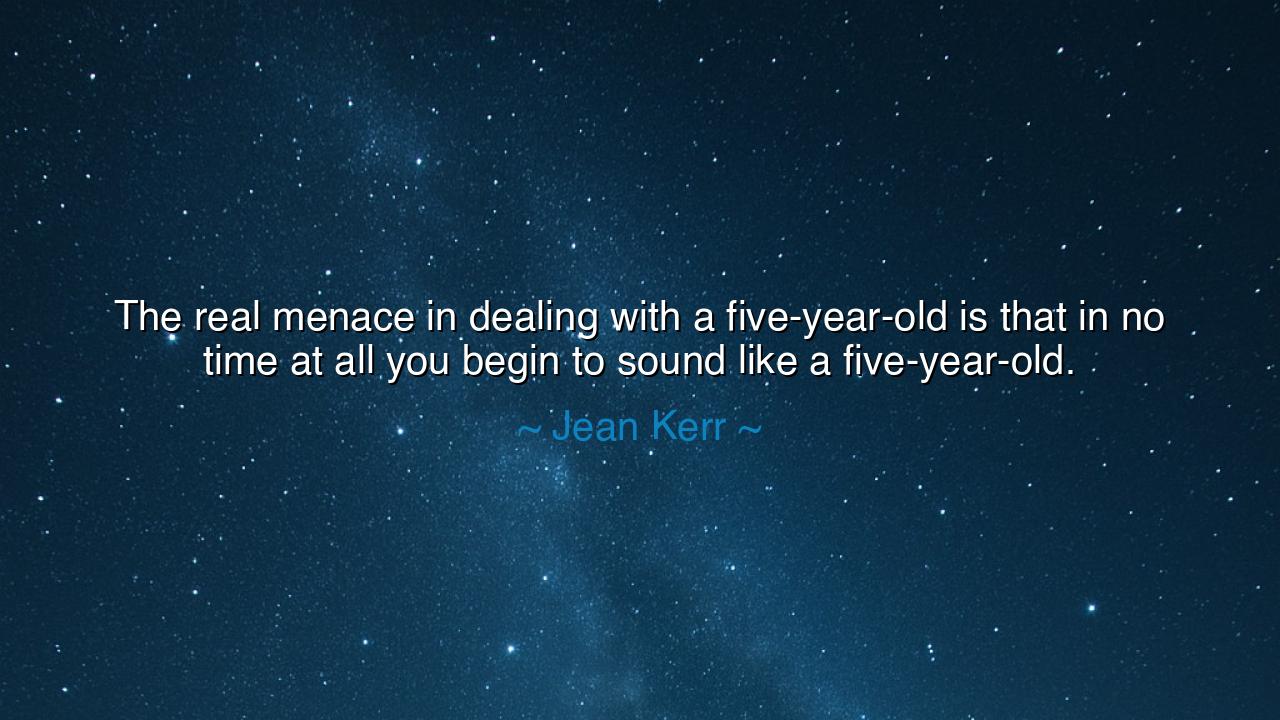
The real menace in dealing with a five-year-old is that in no
The real menace in dealing with a five-year-old is that in no time at all you begin to sound like a five-year-old.






In the witty yet profoundly human words of Jean Kerr, “The real menace in dealing with a five-year-old is that in no time at all you begin to sound like a five-year-old.” we find not merely humor, but deep insight into the nature of parenthood, patience, and the frailty of human temper. Beneath the laughter lies truth: that love, when tested by chaos, can draw even the most composed soul into a storm of childlike frustration. Kerr’s words—light in tone but sharp in understanding—reveal how the relationship between parent and child is both a reflection and a mirror. The adult may think themselves teacher and guide, yet before the unfiltered spirit of a child, they are reminded how thin the veil of maturity truly is.
Jean Kerr, a playwright and essayist of keen observation, often wrote of domestic life with both affection and irony. Her quote arises from the lived experience of motherhood—the daily struggle of raising children who test boundaries and provoke laughter in equal measure. In her humor lies a mother’s confession: that parenting is not an exercise in control, but in humility. When faced with the relentless energy, questions, and stubbornness of a five-year-old, even the wisest adult may find themselves arguing over absurdities, raising their voice, or matching the very behavior they sought to correct. Kerr captures this transformation with wit, but also with compassion, for she knew that in the end, such moments are what make the bond between parent and child so deeply human.
The ancients too understood that the teacher often becomes the student, and that wisdom can dissolve in the face of innocence. Consider the story of Socrates, who once declared that he was the wisest of men because he knew that he knew nothing. Were he to meet a child, he might find his philosophy tested in every question: “Why is the sky blue? Why must I listen? Why do grown-ups make rules?” The child, in their pure curiosity, exposes the adult’s uncertainty. And thus, when the parent begins to sound like the child, it is not always defeat—it is a reminder that the journey of understanding is shared, and that even authority must yield to humility.
Yet Kerr’s humor also holds a warning. The “menace” she speaks of is not the child’s mischief, but the adult’s loss of composure. In moments of fatigue or frustration, love can falter, and reason can regress. The parent who stoops to a child’s level—shouting, pouting, or matching tantrum for tantrum—reveals how fragile our civility can be when tested by love’s demands. But this failing is not shameful; it is natural. It is a testament to how deeply our hearts are entangled in those we love most. The child awakens in us the very emotions we thought we had mastered.
There is, however, a beautiful balance hidden in this chaos. For the same vulnerability that makes a parent lose patience also allows them to rediscover joy, wonder, and playfulness. To sound like a five-year-old is not always to fail—it is to remember. The adult who laughs, who listens, who joins in the nonsense for a while, learns that love thrives not in distance, but in shared humanity. Kerr’s insight, though cloaked in jest, teaches that raising a child is not about superiority, but about connection—a dance between authority and surrender, wisdom and innocence.
History offers us many who have embraced this truth. Maria Montessori, the great educator, built her philosophy on understanding rather than domination. She taught that adults must learn from children—their curiosity, their patience, their purity of focus. To teach effectively, one must listen as a child listens, explore as a child explores. In this, she mirrored the wisdom hidden in Kerr’s humor: that true guidance comes not from power, but from empathy.
And so, let this be the lesson passed down: to raise a child is to be raised anew. When you find yourself sounding like a five-year-old, do not despair; instead, see it as a reminder of your shared humanity. Laugh at your failures, forgive your impatience, and meet your child where they stand. For wisdom does not reside in the unshakable adult, but in the one who can bend—who can kneel, and see the world again through small, wondering eyes.
Thus, in Jean Kerr’s playful yet profound words, we are reminded that the path of parenthood is not one of mastery, but of transformation. The “menace” of the child is, in truth, the miracle of rediscovery—the return to innocence through the trials of love. To guide a child is to journey back to the beginning, and to find, in their laughter and defiance, the echoes of our own humanity.






AAdministratorAdministrator
Welcome, honored guests. Please leave a comment, we will respond soon